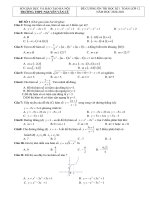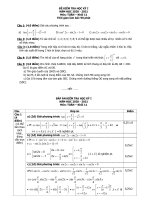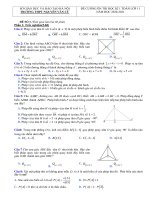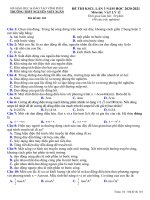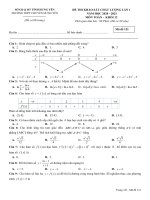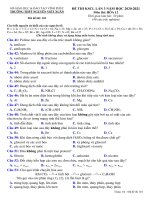Đề thi thử học kì 2 môn Tiếng Anh lớp 11 thí điểm năm 2020 - 2021 THPT chuyên Bảo Lộc có đáp án | Tiếng Anh, Lớp 11 - Ôn Luyện
Bạn đang xem bản rút gọn của tài liệu. Xem và tải ngay bản đầy đủ của tài liệu tại đây (134.53 KB, 7 trang )
<span class='text_page_counter'>(1)</span><div class='page_container' data-page=1>
SỞ GDĐT LÂM ĐỒNG
<b>TRƯỜNG THPT CHUYÊN BẢO LỘC</b>
<i>(đề gồm có 04 trang)</i>
<b>KIỂM TRA HỌC KÌ II NĂM HỌC </b>
<b>Mơn: TIẾNG ANH 11 (chương trình Thí Điểm)</b>
<i>Thời gian làm bài: 60 phút (không kể thời gian phát đề)</i>
<b>Mã đề: Mau</b>
<b>Họ tên HS: …..…………..……… Lớp: ………… Số báo danh:………. Phòng thi: …….</b>
<b>ĐIỂM </b> <b>CHỮ KÝ GIÁM KHẢO </b> <b>SỐ PHÁCH</b>
<b>BẰNG SỐ </b> <b>BẰNG CHỮ </b> <b>GK1</b> <b>GK2 </b>
<i><b>LISTENING </b></i>
<i><b>PART 1: You will hear an English woman called Britta talking to an interviewer about her life in</b></i>
<i><b>Berlin, the capital of Germany. Choose the correct answer (A, B, or C) for each question. (1.0 pt)</b></i>
<b>1. How long has Britta lived in Berlin?</b>
<b>A. four years </b> <b>B. six years </b> <b>C. twenty years </b>
<b>2. The area of Berlin where Britta lives is </b>
<b>A. rather expensive place to live. </b>
<b>B. a good place to eat out. </b>
<b>C. a long way from the city center. </b>
<b>3. How does Britta usually travel around Berlin?</b>
<b>A. She walks. </b> <b>B. She uses her bicycle. </b> <b>C. She uses the tram or bus. </b>
<b>4. Britta says that her nephew, Philippe, likes going </b>
<b>A. to the park with her. </b>
<b>B. to the shops with his parents. </b>
<b>C. to a gallery with her. </b>
<i><b>PART 2: You will hear a conversation between a girl, Kate, and a boy, George. Listen and fill in each</b></i>
<i><b>blank in the note with NO MORE THAN THREE WORDS from the recording. (1.0 pt)</b></i>
Kate complains that she doesn’t remember much of the (5) ______________ because of her health
condition now.
George thinks that Kate’s coughing is (6) ______________ everybody.
Kate afraid that if she stays home, she may repeat last year’s situation in which she missed
<b>(7)______________ and had to do a lot of catching up after that. </b>
</div>
<span class='text_page_counter'>(2)</span><div class='page_container' data-page=2>
<i><b>PHONETICS</b></i>
<i><b>Mark the letter A, B, C, or D on your answer sheet to indicate the word whose underlined part differs</b></i>
<i><b>from the other three in pronunciation in each of the following questions. </b></i> <i><b> (0.25 pts)</b></i>
<b>9. A. passage</b> <b>B. package</b> <b>C. heritage</b> <b>D. teenage</b>
<i><b>Mark the letter A, B, C, or D on your answer sheet to indicate the word that differs from the other three</b></i>
<i><b>in the position of primary stress in each of the following questions. </b></i> <b>(0.25 pts)</b>
<b>10. A. diversity</b> <b>B. ecosystem</b> <b>C. ecology</b> <b>D. variety</b>
<i><b>LEXICO-GRAMMAR</b></i>
<i><b>Mark the letter A, B, C, or D on your answer sheet to indicate the correct answer to each of the</b></i>
<i><b>following questions (4.0 pts)</b></i>
<b>11. ____________ have discovered signs of human activity dating back almost 30,000 years. </b>
<b>A. Archaeologists</b> <b>B. Biologists</b> <b>C. Sociologist</b> <b>D. Psychologists</b>
<b>12. According to UNESCO, the Sydney Opera House is a great ____________ work of the 20th century.</b>
<b>A. structural</b> <b>B. cultural</b> <b>C. archaeological</b> <b>D. architectural</b>
<b>13. They now regret ____________ their son by providing too many material possessions. </b>
<b>A. having spoiled</b> <b>B. having been spoiled</b> <b>C. to have spoiled</b> <b>D. to have been spoiled</b>
<b>14. - Why are your hands so dirty?</b>
- I ____________ my bike all afternoon.
<b>A. have been repaired</b> <b>B. repaired</b> <b>C. have been repairing</b> <b>D. has been repaired</b>
<b>15. Einstein, ____________ the university entrance exam, discovered relativity.</b>
<b>A. fail</b> <b>B. failing</b> <b>C. failed</b> <b>D. to fail</b>
<b>16. If you heat ice, it ____________ to water. </b>
<b>A. would be turned</b> <b>B. turned </b> <b>C. would turn</b> <b>D. turns</b>
<i><b>READING</b></i>
<i><b>PART 1: Read the following passage and mark the letter A, B, C, or D on your answer sheet to indicate </b></i>
<i><b>the correct word or phrase that best fits each of the numbered blanks (1.2 pt)</b></i>
<b>TOURISM IN WALES</b>
It is estimated that in north Wales 30 per cent of all jobs can be directly attributed (17) ________ tourism,
but the fact that visitors spend their money in a variety of ways has a beneficial effect on other things too.
Many village shops would have to close if they were not supported by income from tourists, and the money
spent on local souvenirs can prevent local industries from going out of business.
<b>(18) ________, tourism also has disadvantages. For example, many of the roads in the Snowdonia area are</b>
extremely narrow and tourist cars cause traffic jams. Some farmers and local merchants complain that they
<b>(19) ________ it difficult for them to do their work as car parks full up during busy periods and many</b>
visitors cause obstructions by parking across gateways etc..
Nevertheless, the appeal of areas of natural beauty to visitors has led to the growth of many organizations
dedicated to reducing or balancing these (20) ________. Many parts of the country now operate
conservation schemes, supported by voluntary contributions. In some locations, tourist operators have set
up their own organizations and put back money into the community by making donations to local
conservation projects.
<b>17. A. with</b> <b>B. to</b> <b>C. for</b> <b>D. in</b>
</div>
<span class='text_page_counter'>(3)</span><div class='page_container' data-page=3>
<b>19. A. take</b> <b>B. do</b> <b>C. make</b> <b>D. get</b>
<b>20. A. drawbacks</b> <b>B. victories</b> <b>C. defeats</b> <b>D. occupations</b>
<i><b>PART 2: Read the following passage and mark the letter A, B, C, or D on your answer sheet to indicate</b></i>
<i><b>the correct answer to each of the questions (1.2 pt)</b></i>
In 2002, several obese teenagers in the USA sued McDonald’s, claiming that the company was responsible
for making them fat. They argued that McDonald’s deliberately misled them into thinking that their
cheeseburgers and other products were healthy and nutritious food. They claimed that the company had not
warned them about the health problems that can result from eating too much salty, high-fat food and
drinking too many sugary drinks: diabetes, high blood pressure and obesity. The mother of one of the
children, who at the age of 15 weighed more than 180 kilograms, said in her statement: ‘I always believed
McDonald’s was healthy for my son.’
McDonald’s rejected the claim that they were responsible for these teenagers’ health problems. ‘People
don’t go to sleep thin and wake up obese,’ said McDonald’s lawyer, Brad Lerman. ‘The understanding of
what hamburgers and French fries do has been with us for a long, long time,’ he added. The judge reed, and
dismissed the case, saying: ‘it is not the place of the law to protect people against their own excesses.’ In
other words, if people choose to eat a lot of unhealthy food, they can’t blame the company that sold <b>it to</b>
them.
Other similar lawsuits against fast food companies in the USA have also failed. In 2005, the US House of
Representatives passed a bill which became known as the ‘Cheeseburger Biir. It made it much harder for
obese people to take legal action against the food industry. However, the bill has not ended the arguments
about responsibility. There is some scientific evidence to suggest that fast food is addictive, and harmful
too. So is selling fast food the same, in a way, as drug-dealing?
<b>21. Which of the following is the best title for the passage?</b>
<b>A. Obesity – who is to blame? </b> <b>B. Is fast food addictive?</b>
<b>C. Is fast food really healthy? </b> <b>D. How to get rid of fast food?</b>
<b>22. According to the obese teenagers in the USA who sued McDonald’s, which of the following health</b>
<b>problems was NOT mentioned?</b>
<b>A. Diabetes </b> <b>B. hypertension C. obesity </b> <b>D. heart disease</b>
<b>23. In paragraph 2, the word “rejected” is closest in meaning to __________.</b>
<b>A. accepted </b> <b>B. denied </b> <b>C. ignored </b> <b>D. agreed</b>
<b>24. What happens if people choose to eat a lot of unhealthy food?</b>
<b>A. The company will be responsible for their health problems.</b>
<b>B. They may get financial support from the company.</b>
<b>C. They will surely succeed in lawsuits.</b>
<b>D. They can’t force the company to be responsible for them.</b>
<i><b>WRITING</b></i>
<b>PART 1: Mark the letter A, B, C, or D on your answer sheet to indicate the underlined part that needs</b>
<i><b>correction in each of the following questions (0.5 pt)</b></i>
<b>25. My sister told me that she had met my teacher at the supermarket yesterday.</b>
<b> A</b> <b>B</b> <b> C </b> <b>D </b>
<b>26. Deforestation is one of the biggest environmental threaten to the ecological balance.</b>
</div>
<span class='text_page_counter'>(4)</span><div class='page_container' data-page=4>
<b>PART 2: Rewrite each of the sentences in such a way that each has the same meaning as the original </b>
<i><b>one (0.5 pt)</b></i>
<b>27. Tessa said: “It was me. I ate all the cake yesterday.” (ADMIT)</b>
=> ………
<b>28. “If I lose my passport, I’ll be in trouble.” said Lucy.</b>
=> ………...
<b>PART 3: (1.0 pt) Your pen pal Susanna recently sent you an email in which she asked you to describe </b>
<i><b>what your city will be like in a 10 years’ time. Write an email of about 160 words to express your </b></i>
<i><b>predictions of your city at the time. Choose THREE of the following to write about:</b></i>
<i><b>+ population (size, people’s origin, …)</b></i>
<i><b>+ the environment (quality of the air, parks and trees, fresh water, ….)</b></i>
<i><b>+ traffic modes </b></i>
<i><b>+ facilities (schools, hospitals, entertainment centers, sports centers, …)</b></i>
<i>……….</i>
<i>………</i>
<i>……….</i>
<i>………</i>
<i>……….</i>
<i>………</i>
___THE END____
SỞ GDĐT LÂM ĐỒNG
<b>TRƯỜNG THPT CHUYÊN BẢO LỘC</b>
<i>(đề gồm có 04 trang)</i>
<b>KIỂM TRA HỌC KÌ II NĂM HỌC </b>
<b>Mơn: TIẾNG ANH 11 (chương trình Thí Điểm)</b>
<i>Thời gian làm bài: 60 phút (khơng kể thời gian phát đề)</i>
<b>Mã đề: Mau</b>
</div>
<span class='text_page_counter'>(5)</span><div class='page_container' data-page=5>
<i><b>LISTENING </b></i>
<i><b>PART 1:</b></i>
<b>1. A </b> <b>2. B</b> <b>3. B </b> <b>4. C </b>
<i><b>PART 2:</b></i>
<b>5. lecture</b> <b>6. annoying </b> <b>7. a whole week</b> <b>8. book </b>
<i><b>PHONETICS</b></i>
<b>9. D</b> <b>10. B</b>
<i><b>LEXICO-GRAMMAR</b></i>
<b>11. A</b> <b>12. D</b> <b>13. A</b> <b>14. C</b> <b>15. B</b> <b>16. D </b>
<i><b>READING</b></i>
<i><b>PART 1: CLOZE READING</b></i>
<b>17. B </b> <b>18. D</b> <b>19. C </b> <b>20. A </b>
<i><b>PART 2: READING COMPREHENSION </b></i>
<b>21. A</b> <b>22. D</b> <b>23. B</b> <b>24. D</b>
<i><b>WRITING</b></i>
<b>PART 1:</b>
<b>25. D</b> <b>26. C</b>
<b>PART 2:</b>
<b>27. Tessa admitted having eaten all the cake the day before./ Tessa admitted that she had eaten all the </b>
cake the day before.
<b>28. Lucy said if she lost her passport, she would be in trouble. </b>
<b>PART 3:</b>
<b>TASK ACHIEVEMENT </b> <b>MARK </b>
- three ideas targeted + coherence & cohesion + satisfactory
grammar + vocab (>= 140 words) 1.0 pt
- two ideas targeted + coherence & cohesion + 1-2 grammar
mistakes (between 100 – 130 words) 0.75 pt
- one idea targeted + basic grammar & vocabulary (between 70
and 90 words)
</div>
<span class='text_page_counter'>(6)</span><div class='page_container' data-page=6>
- one idea targeted + basic grammar & vocabulary (between 50
and 60 words)
0.25 pt
<b>SPEAKING DESCRIPTORS </b>
<b>TASK ACHIEVEMENT </b> <b>MARK </b>
- speaks fluently with only occasional repetition or
self-correction; hesitation is usually content-related and only rarely to
search for language
- develops topics coherently and appropriately
- uses a wide vocabulary resource readily and flexibly to convey
precise meaning
- uses paraphrase effectively as required
uses a wide range of structures flexibly
- produces a majority of error-free sentences with only very
occasional inappropriacies or basic/non-systematic errors
- uses a wide range of pronunciation features
- sustains flexible use of features, with only occasional lapses
- is easy to understand throughout; L1 accent has minimal effect
on intelligibility
1.9 – 2.0 pts
- speaks at length without noticeable effort or loss of coherence
- may demonstrate language-related hesitation at times, or some
repetition and/or self-correction
- uses a range of connectives and discourse markers with some
flexibility
- uses a wide vocabulary resource readily and flexibly to convey
precise meaning
- uses paraphrase effectively as required
uses a wide range of structures flexibly
uses a range of complex structures with some flexibility
- frequently produces error-free sentences, though some
grammatical mistakes persist
uses a wide range of pronunciation features
- sustains flexible use of features, with only occasional lapses
- is easy to understand throughout; L1 accent has minimal effect
on intelligibility
1.7 – 1.8 pts
- is willing to speak at length, though may lose coherence at times
due to occasional repetition, self-correction or hesitation
- uses a range of connectives and discourse markers but not
always appropriately
- has a wide enough vocabulary to discuss topics at length and
make meaning clear in spite of inappropriacies
- generally paraphrases successfully
- uses a mix of simple and complex structures, but with limited
flexibility
- may make frequent mistakes with complex structures, though
these rarely cause comprehension problems
</div>
<span class='text_page_counter'>(7)</span><div class='page_container' data-page=7>
- uses a range of pronunciation features with mixed control
- shows some effective use of features but this is not sustained
- usually maintains flow of speech but uses repetition,
self-correction and/or slow speech to keep going
- may over-use certain connectives and discourse markers
- produces simple speech fluently, but more complex
communication causes fluency problems
- manages to talk about familiar and unfamiliar topics but uses
vocabulary with limited flexibility
- attempts to use paraphrase but with mixed success
produces basic sentence forms with reasonable accuracy
- uses a limited range of more complex structures, but these
usually contain errors and may cause some comprehension
problems
</div>
<!--links-->
